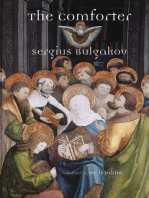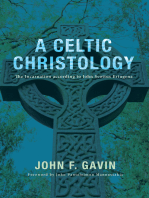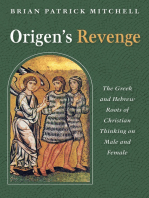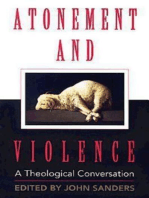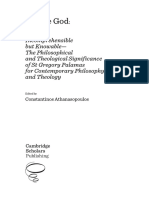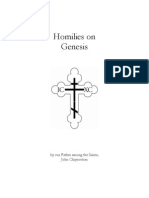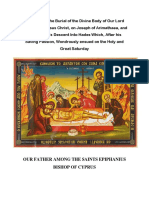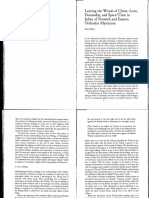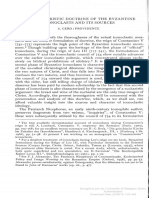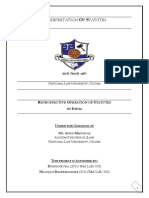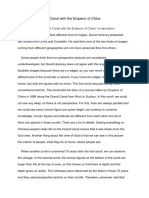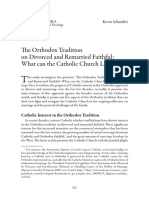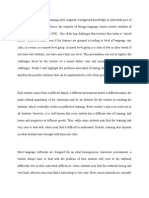Professional Documents
Culture Documents
Aaron Kimel Homily
Uploaded by
akimelOriginal Description:
Copyright
Available Formats
Share this document
Did you find this document useful?
Is this content inappropriate?
Report this DocumentCopyright:
Available Formats
Aaron Kimel Homily
Uploaded by
akimelCopyright:
Available Formats
Funeral Homily for Aaron Edward Kimel Delivered by Father Alvin F. Kimel, Jr.
22 June 2012 In the Name of the Father and the Son and the Holy Spirit. Amen. Introduction Not once have I ever entertained the possibility that I would ever find myself in this moment, preaching at the funeral of one of my children. I stand here today not to offer a eulogy for my son Aaron. There will be other opportunities for such eulogies, as we each seek to find healing for our loss and to understand the tragic decision of Aaron to end his life. My purpose, rather, is to offer an argument. Aaron was brilliant. He loved a good argument, and he usually won. Aaron and I did not often speak about God. At some point in high school he moved into a scientific materialism from which he would not be moved. He was not a militant atheist, as he acknowledged that it was possible, however unlikely, that God might exist; but he simply could not, would not, embrace a Christian worldview. Yet for the sake of family, he always said grace with us at dinnertime.
I am not a philosopher. There is no argument I can offer that Aaron could not demolish in five seconds flat. I stand before you as a priest of the Church for over thirty years. But most importantly I stand before you as a bereaved father, who has been utterly devastated by the death of his beloved son. Aarons death has been a traumaticand clarifyingevent for me. I see reality more sharply, more clearly than I have ever seen it before. I stand before you, therefore, either as a madman or a prophet of God Almighty. I cannot judge. You must be my judge. God will most certainly be my judge. Nihilism Aaron did not believe in God. He did not believe in transcendent reality. He did not believe in a life beyond the grave. Life has no ultimate meaning or significance. After death there is only nothing. In Aarons room I found my old copy of the short stories of Ernest Hemingway. I do not know when he borrowed it. Perhaps he read the story A Clean, Well-Lighted Place. In this story we read the prayer of nihilism: Our nada who art in nada, nada be thy name thy kingdom nada thy will be nada in nada as it is in nada. Give us this nada our daily nada and nada us our nada as we nada our nadas and nada us not into nada but
deliver us from nada; pues nada. Hail nothing full of nothing, nothing is with thee. It is a relentlessly bleak, hopeless view. Despair is its only conclusion. Aaron was a man who lived in profound interior pain. He had come to the conclusion that nothing in this world, neither medicine nor psychiatry nor career nor even the love of his family could deliver him from the despair and futility that had possessed and paralyzed him. And so he made what seemed, to him, to be the logical choice. A logical choice if, and only if, Aarons worldview is true. If Aaron is right, then he has indeed found relief from his suffering, relief in nothingness, relief in nada, nada, nada. We who have been left behind must now suffer the repercussions of Aarons decision; but he at least he is at peace if Aaron is right The Christian Alternative But there is an alternative. Consider the possibility that there really is a divine Creator, a transcendent deity of infinite love who has brought the world into being from out of nothing. Consider the possibility that this Creator has made human beings in his image in such a way that we can only find our supreme happiness in communion with him. Consider the possibility that this God has actually entered into his creation, taking upon himself the limitations of
humanity, including even suffering and death, precisely to restore us to himself and incorporate us into his divine life. Consider the possibility that for us this God died a cruel and horrific death on Calvary and rose to indestructible life on Easter morning, destroying the power of death once and for all and opening history to the promise of a new heaven and a new earth, a future where there shall be no more death, neither sorrow, nor crying, neither shall there be any more pain: for the former things are passed away. God is Love, for he is eternally the Father, Son, and Holy Spirit. The world springs from love and will be consummated in love. In the words of St Isaac the Syrian: In love did God bring the world into existence; in love does he guide it during its temporal existence; in love is he going to bring it to that wondrous transformed state, and in love will the world be swallowed up in the great mystery of him who has performed all these things. It may all sound too good to be true. It may all sound like a an old wives tale. But it meets Aarons objections head on. Life is not nothingness. Life is not absurd. God is good and wills only our good. God is love and his love will triumph. There is thus genuine hope for liberation, healing, transformation, rebirth, both in this world and in the coming kingdom.
This is the Christian faith in which Aaron was raised yet which he eventually found to be unpersuasive. The empiricist worldview which dominates our culture increasingly renders the Christian worldview implausible, and the whole world consequently suffers from the despair of nihilism. I cannot, will not acquiesce to Aarons agnosticism and its resignation to despair. I know something of the darkness that bound Aarons heart; but this tragedy has quickened my faith, and I pray that it will do so for you also. One of my favorite books is C. S. Lewiss Chronicles of Narnia is the Silver Chair. The children, along with the marsh-wiggle Puddleglum, are captured by the Green Lady and taken into her underworld domain. She casts a spell upon them and attempts to persuade them that this dreary underworld is the real world, that everything that they remember about Narnia, and the true world is but a dream. But Puddleglum stands fasts; he refuses to disbelieve. He refuses to disbelieve in Narnia, and he refuses to disbelieve in the rightful king of Narnia, the great lion Aslan: Suppose we have only dreamed, or made up, all those thingstrees and grass and sun and moon and stars and Aslan himself. Suppose we have. Then all I can say is that, in that case, the made-up things seem a good deal more important than the real ones. Suppose this black pit of a kingdom of yours is the only world. Well, it strikes me as a pretty poor one. And that's a
funny thing, when you come to think of it. We're just babies making up a game, if you're right. But four babies playing a game can make a play-world which licks your real world hollow. That's why I'm going to stand by the play-world. I'm on Aslan's side even if there isn't any Aslan to lead it. I'm going to live as like a Narnian as I can even if there isn't any Narnia. The Christian vision of reality is so much more real, more beautiful, more enchanting, and profoundly more true than any vision of reality offered by modern culture and the scientific worldview. And so here is my first response to my son: Aaron, I do not know if you had retained your faith in Christ whether your pain would have been more bearable; but it might have given you grounds for hope, for a supernatural hope that the world cannot give. Aarons Hope But what hope does my son now have? He is dead. He died an unbeliever. He died a suicide. This is the hard, terrible truth. Aaron would not want us to minimize the harshness of any of this. He knew Christine and I would find this very, very hard. In the old days, some preachers would have declared him damned. He certainly would not have been granted a church burial. Today we know more about depression and mental illness. We know how
depression constrains and limits our existential freedom. Aaron did not kill himself with blasphemies on his lips. His suicide was not the culmination of a wicked life. It was an escape from a world that could not heal the sickness of his mind and bring relief from intolerable suffering. Aaron jumped to his death because he had lost all hope, because despair had possessed his being. This I believe to be true. And so I know that God will be merciful. But even so, I wish to say something more. Not only will the eternal Father be merciful to my Aaron; but he will most assuredly heal his heart, deliver him from the bonds of darkness, and raise him into glorified life with Jesus Christ the eternal Son, with the Blessed Virgin Mary and with all the saints. Aaron will know the joy and bliss of the kingdom of God. Despite his suicidal disbelief, Aaron will not be permitted to have the last word. The risen Christ reserves that word to himself, and it is a word of the absolute triumph of love and grace. By the inner promptings of the Holy Spirit, Aaron will open his heart to the mercy and love of God. He will allow the Father to flood him with his holy light and liberate him from all despair. He will allow the Savior to bind his wounds and forgive his sins. He will allow the Spirit to fill his heart with joy and grace. Painful purification may be necessaryit is not easy thing to relinquish our self-will; it is not an easy thing to repent of ones sinsbut the grace of God will triumph in the heart
of my son. This I declare in the name of Jesus. Amen. Amen. Brought face to face with his Savior, can we entertain, even for one moment, the possibility that Aaron would hold out eternally against that unconditional love and mercy that is God the Holy Trinity? How could he? Did he not love his mother? Did he not love his siblings Alvin, Bredon, and Taryn? Did he not love his best friends Brian, Jill, and Laura? Did he not love me, his broken father? Brothers and sisters, there is no time limit on the unbounded love of God. It does not expire at the moment of death. God has created us for himself. In love Christ searches and searches for that one lost sheep and does not rest until he has found it and restored it to the fold. Aarons ultimate salvation is revealed in the love I hold in my heart for my beloved son. In the words of the Scottish preacher George MacDonald: Shall a man be more merciful than God? Shall, of all his glories, his mercy alone not be infinite? Shall a brother love a brother more than The Father loves a son?more than The Brother Christ loves his brother? God forbid! Gods love infinitely surpasses our love for Aaron. God will find a way to awaken faith and repentance in his heart. Divine love will conquer both obstinacy and despair. Gods mercifulness, as St Isaac writes, is far more extensive than we can conceive.
I will not be saved without my Aaron. There can be no heaven for me without my son. My love for him is too great. He is too much a part of my life, my identity. We will be saved together in Christ. God will make it so. And so, my brothers and sisters, I bid you to give thanks for the life that was, and is, Aaron Edward Kimel. I bid you to pray for my son. Pray that God will forgive his sins, heal his brokenness, and renew his heart and soul in the life and glory of the Holy Spirit. And I bid you to hope for Aarons eternal salvation with confident and indomitable hope. He will be restored to us in the kingdom of Jesus Christ, and we will be restored to him. Our love will not be broken; our love is not broken. The infinite, unfathomable grace of God will triumph. God is good. God is merciful. God is love. God is Father, Son, and Holy Spirit. I close with the words of the 13th century English mystic, Dame Julian of Norwich: All shall be well, and all shall be well, and all manner of things shall be well. Amen.
You might also like
- Loudovikos, Being and Essence. Reciprocal Logoi and Energies in Maximus The Confessor and Thomas AquinasDocument31 pagesLoudovikos, Being and Essence. Reciprocal Logoi and Energies in Maximus The Confessor and Thomas AquinasDrasko100% (1)
- Bright Morning of The Soul: John of The Cross On TheosisDocument22 pagesBright Morning of The Soul: John of The Cross On Theosisakimel100% (5)
- Creation Is IncarnationDocument21 pagesCreation Is IncarnationakimelNo ratings yet
- A Celtic Christology: The Incarnation according to John Scottus EriugenaFrom EverandA Celtic Christology: The Incarnation according to John Scottus EriugenaNo ratings yet
- 'But The Problem Remains': John Paul II and The Universalism of The Hope For SalvationDocument25 pages'But The Problem Remains': John Paul II and The Universalism of The Hope For SalvationakimelNo ratings yet
- Basil and ApokatastasisDocument21 pagesBasil and Apokatastasisakimel100% (2)
- Origen’s Revenge: The Greek and Hebrew Roots of Christian Thinking on Male and FemaleFrom EverandOrigen’s Revenge: The Greek and Hebrew Roots of Christian Thinking on Male and FemaleNo ratings yet
- The Orthodox Conception of Tradition and The Development of DoctrineDocument6 pagesThe Orthodox Conception of Tradition and The Development of DoctrineakimelNo ratings yet
- (Dumbarton Oaks Medieval Library) Maximus The Confessor, Nicholas Constas (Ed.) - On The Difficulties in The Church Fathers - The Ambigua. II-Harvard Univer PDFDocument388 pages(Dumbarton Oaks Medieval Library) Maximus The Confessor, Nicholas Constas (Ed.) - On The Difficulties in The Church Fathers - The Ambigua. II-Harvard Univer PDFCosmin Cosorean100% (5)
- One Path For All: Gregory of Nyssa on the Christian Life and Human DestinyFrom EverandOne Path For All: Gregory of Nyssa on the Christian Life and Human DestinyNo ratings yet
- Maximus The Confessor - Stephen J. Shoemaker - The Life of The Virgin (2012, Yale University Press) PDFDocument227 pagesMaximus The Confessor - Stephen J. Shoemaker - The Life of The Virgin (2012, Yale University Press) PDFAndrei Dumitrescu100% (5)
- Saint Photius The Great - Mystagogy of The Holy SpiritDocument37 pagesSaint Photius The Great - Mystagogy of The Holy Spiritvictor_georgescu100% (3)
- Analogia: The Pemptousia Journal for Theological Studies Vol 2 (St Maximus the Confessor)From EverandAnalogia: The Pemptousia Journal for Theological Studies Vol 2 (St Maximus the Confessor)No ratings yet
- Hypostasis and HypostaticityDocument43 pagesHypostasis and Hypostaticityakimel100% (1)
- Ever-Moving Repose: A Contemporary Reading of Maximus the Confessor’s Theory of TimeFrom EverandEver-Moving Repose: A Contemporary Reading of Maximus the Confessor’s Theory of TimeNo ratings yet
- The Ontological Realism of Our Hopes HereafterDocument6 pagesThe Ontological Realism of Our Hopes HereafterakimelNo ratings yet
- The Trinity in Scripture and Greek FathersDocument3 pagesThe Trinity in Scripture and Greek FathersNoxTattoo100% (2)
- Eschatology and The Byzantine Liturgy by David M. Petras1Document7 pagesEschatology and The Byzantine Liturgy by David M. Petras1FabianModernellCostaNo ratings yet
- Atonement and Violence: A Theological ConversationFrom EverandAtonement and Violence: A Theological ConversationRating: 2.5 out of 5 stars2.5/5 (3)
- Simplicity of God According To ST GregorDocument14 pagesSimplicity of God According To ST Gregortensous12113100% (2)
- Ilaria Ramelli - Theological StudiesDocument241 pagesIlaria Ramelli - Theological Studies123KalimeroNo ratings yet
- Homilies On Genesis - Saint John ChrysostomDocument249 pagesHomilies On Genesis - Saint John ChrysostomJavier100% (6)
- The Abolishment of Retribution in The Church FathersDocument13 pagesThe Abolishment of Retribution in The Church Fathersakimel100% (3)
- The Human Person As An Icon of The TrinityDocument20 pagesThe Human Person As An Icon of The Trinityakimel100% (3)
- Staniloae Final DraftDocument35 pagesStaniloae Final DraftluciantimofteNo ratings yet
- Eschatology and Final Restoration (Apokatastasis) in Origen, Gregory of Nyssa and Maximus The ConfessorDocument7 pagesEschatology and Final Restoration (Apokatastasis) in Origen, Gregory of Nyssa and Maximus The Confessorakimel100% (2)
- (John Behr) Asceticism and Anthropology in Irenaeu PDFDocument163 pages(John Behr) Asceticism and Anthropology in Irenaeu PDFmementomeiNo ratings yet
- Louth Maximus EcclesiologyDocument14 pagesLouth Maximus Ecclesiologyic143constantin100% (1)
- SAINT ORIGEN AND THE FALSE CONDEMNATIONDocument5 pagesSAINT ORIGEN AND THE FALSE CONDEMNATIONGregory WassenNo ratings yet
- Woman and The Salvation of The WorldDocument4 pagesWoman and The Salvation of The WorldΠ. ΧρίστοςNo ratings yet
- Virgin Earth, Virgin Birth in IrenaeusDocument32 pagesVirgin Earth, Virgin Birth in IrenaeusElí GutierrezNo ratings yet
- Jean Hani-The Sacrifice PDFDocument12 pagesJean Hani-The Sacrifice PDFSahrian100% (2)
- The Philosophical Structures of Palamism (Rowan Williams)Document11 pagesThe Philosophical Structures of Palamism (Rowan Williams)Monachus IgnotusNo ratings yet
- Naturally and by Grace: Maximus The Confessor On The Operation of The WillDocument24 pagesNaturally and by Grace: Maximus The Confessor On The Operation of The Willakimel0% (1)
- ST Maximus The Confessor - Logos and LogoiDocument18 pagesST Maximus The Confessor - Logos and LogoiCaio CardosoNo ratings yet
- Apocatastasis in Patristic TheologyDocument24 pagesApocatastasis in Patristic Theologyakimel100% (7)
- The Redemption of Evolution: Maximus The Confessor, The Incarnation, and Modern ScienceDocument6 pagesThe Redemption of Evolution: Maximus The Confessor, The Incarnation, and Modern Scienceakimel100% (4)
- The Salvation of The World According To ST SilouanDocument12 pagesThe Salvation of The World According To ST Silouanakimel100% (1)
- Coptic Palladiana2 The Life of EvagriusDocument20 pagesCoptic Palladiana2 The Life of EvagriusLada Jagust-Akkad100% (1)
- Believe It or NotDocument15 pagesBelieve It or Notakimel100% (3)
- Jacob S Ladder On Angels PDFDocument28 pagesJacob S Ladder On Angels PDFJoe Chen100% (3)
- God Became Man to Deify HumanityDocument30 pagesGod Became Man to Deify Humanitygrey0145100% (1)
- (VigChr Supp 077) P. Tzamalikos - Origen' Cosmology and Ontology of Time, 2006 PDFDocument422 pages(VigChr Supp 077) P. Tzamalikos - Origen' Cosmology and Ontology of Time, 2006 PDFNovi Testamenti Filius100% (4)
- Fifth Ecumenical CouncilDocument5 pagesFifth Ecumenical CouncilakimelNo ratings yet
- Will All Be Saved?Document8 pagesWill All Be Saved?akimel100% (1)
- Person, Eros, Critical Ontology: An Attempt To Recapitulate Christos Yannaras' PhilosophyDocument9 pagesPerson, Eros, Critical Ontology: An Attempt To Recapitulate Christos Yannaras' PhilosophyTomNo ratings yet
- Basil Doctrine of Tradition Holy SpiritDocument15 pagesBasil Doctrine of Tradition Holy SpiritMelisa Mack100% (2)
- Orthodox Readings of Vincent of LerinsDocument7 pagesOrthodox Readings of Vincent of LerinsakimelNo ratings yet
- (Alexander Golitzin Bogdan G. Bucur (Ed.) ) Mystag (B-Ok - CC)Document373 pages(Alexander Golitzin Bogdan G. Bucur (Ed.) ) Mystag (B-Ok - CC)proklosNo ratings yet
- St. Bonaventure's On The Reduction of The Arts To TheologyDocument34 pagesSt. Bonaventure's On The Reduction of The Arts To TheologyDavid MencikNo ratings yet
- Apocatastasis & TransfigurationDocument28 pagesApocatastasis & Transfigurationakimel100% (5)
- There Is Nothing Untrue in The Protevangelion's Joyful, Inaccurate TalesDocument2 pagesThere Is Nothing Untrue in The Protevangelion's Joyful, Inaccurate Talesakimel100% (1)
- God and FreedomDocument13 pagesGod and FreedomakimelNo ratings yet
- Fire of Purgation in Gregory of Nyssa by Armando ElkhouryDocument27 pagesFire of Purgation in Gregory of Nyssa by Armando ElkhouryakimelNo ratings yet
- The Redemption of Evolution: Maximus The Confessor, The Incarnation, and Modern ScienceDocument6 pagesThe Redemption of Evolution: Maximus The Confessor, The Incarnation, and Modern Scienceakimel100% (4)
- 'But The Problem Remains': John Paul II and The Universalism of The Hope For SalvationDocument25 pages'But The Problem Remains': John Paul II and The Universalism of The Hope For SalvationakimelNo ratings yet
- The Problem of Hell: A Thomistic Critique of David Bentley Hart's Necessitarian UniversalilsmDocument21 pagesThe Problem of Hell: A Thomistic Critique of David Bentley Hart's Necessitarian UniversalilsmakimelNo ratings yet
- Henri de Lubac and Radical OrthodoxyDocument30 pagesHenri de Lubac and Radical OrthodoxyakimelNo ratings yet
- The Sacrament of The Altar: To Save This Essay..Document1 pageThe Sacrament of The Altar: To Save This Essay..akimelNo ratings yet
- Justification by FaithDocument7 pagesJustification by FaithakimelNo ratings yet
- Paul and UniversalismDocument15 pagesPaul and Universalismakimel100% (1)
- Apokatastasis in Gnostic Coptic TextsDocument14 pagesApokatastasis in Gnostic Coptic Textsakimel100% (1)
- Ramelli Reviews The Devil's Redemption by McClymondDocument10 pagesRamelli Reviews The Devil's Redemption by McClymondakimelNo ratings yet
- Fifth Ecumenical CouncilDocument5 pagesFifth Ecumenical CouncilakimelNo ratings yet
- The Problem of The Desiderium Naturale in The Thomistic TraditionDocument10 pagesThe Problem of The Desiderium Naturale in The Thomistic TraditionakimelNo ratings yet
- The Natural Desire To See GodDocument21 pagesThe Natural Desire To See GodakimelNo ratings yet
- Eternally Choosing HellDocument18 pagesEternally Choosing Hellakimel100% (1)
- Nicholas Healy - HENRI DE LUBAC ON NATURE AND GRACE: A NOTE ON SOME RECENT CONTRIBUTIONS TO THE DEBATEDocument30 pagesNicholas Healy - HENRI DE LUBAC ON NATURE AND GRACE: A NOTE ON SOME RECENT CONTRIBUTIONS TO THE DEBATEFrancisco J. Romero CarrasquilloNo ratings yet
- Annihilation or Salvation? A Philosophical Case For Preferring Universalism To AnnihilationismDocument24 pagesAnnihilation or Salvation? A Philosophical Case For Preferring Universalism To AnnihilationismakimelNo ratings yet
- Cunningham37 2Document12 pagesCunningham37 2markow2No ratings yet
- With No Qualifications: The Christological Maximalism of The Christian EastDocument7 pagesWith No Qualifications: The Christological Maximalism of The Christian EastakimelNo ratings yet
- There Is Nothing Untrue in The Protevangelion's Joyful, Inaccurate TalesDocument2 pagesThere Is Nothing Untrue in The Protevangelion's Joyful, Inaccurate Talesakimel100% (1)
- The True Believer by Aidan KavanaughDocument10 pagesThe True Believer by Aidan KavanaughakimelNo ratings yet
- Homily On The Burial of ChristDocument20 pagesHomily On The Burial of ChristakimelNo ratings yet
- Leaving The Womb of ChristDocument17 pagesLeaving The Womb of ChristakimelNo ratings yet
- Ibn Arabī, Ibn Qayyim Al-Jawziyya, and The Political Functions of Punishment in The Islamic HellDocument0 pagesIbn Arabī, Ibn Qayyim Al-Jawziyya, and The Political Functions of Punishment in The Islamic HellakimelNo ratings yet
- Heat and Light: David Bentley Hart On The Fires of HellDocument9 pagesHeat and Light: David Bentley Hart On The Fires of Hellakimel100% (1)
- Revering An Image of The Holy TrinityDocument3 pagesRevering An Image of The Holy TrinityakimelNo ratings yet
- Augustinianism and PredestinationDocument36 pagesAugustinianism and Predestinationakimel100% (1)
- Reading The Fathers TodayDocument12 pagesReading The Fathers TodayakimelNo ratings yet
- The Eucharistic Doctrine of The Byzantine IconoclastsDocument19 pagesThe Eucharistic Doctrine of The Byzantine IconoclastsakimelNo ratings yet
- 'But The Problem Remains': John Paul II and The Universalism of The Hope For SalvationDocument25 pages'But The Problem Remains': John Paul II and The Universalism of The Hope For SalvationakimelNo ratings yet
- Retrospective Operations of Statutes in IndiaDocument17 pagesRetrospective Operations of Statutes in Indiasaqib nisarNo ratings yet
- William Wordsworth As A Lover of Nature With Reference To Critical Appreciation of His Poem 'Tintern Abbey'Document28 pagesWilliam Wordsworth As A Lover of Nature With Reference To Critical Appreciation of His Poem 'Tintern Abbey'Rituparna Ray Chaudhuri75% (4)
- What Should Be in Your ThesisDocument6 pagesWhat Should Be in Your ThesisDhea HurisfaNo ratings yet
- The 68 Blemishes of The Nafs Aka The Commanding Self (Sufi, Anonymous)Document2 pagesThe 68 Blemishes of The Nafs Aka The Commanding Self (Sufi, Anonymous)stimoceiverNo ratings yet
- Symbol PoemDocument2 pagesSymbol PoemaekulakNo ratings yet
- What Makes A Good FriendDocument11 pagesWhat Makes A Good FriendAndreea MacsimNo ratings yet
- Bee Travelers IMC Plan SummaryDocument46 pagesBee Travelers IMC Plan SummaryTanvir TonoyNo ratings yet
- Essentialism: Reported By: Edward Joseph C. LopezDocument35 pagesEssentialism: Reported By: Edward Joseph C. LopezCarel Faith AndresNo ratings yet
- Principles HCIDocument7 pagesPrinciples HCIValeriano StevensNo ratings yet
- A Day On The Grand Canal With The Emperor of ChinaDocument2 pagesA Day On The Grand Canal With The Emperor of ChinaÇağrı KoçNo ratings yet
- BUS3110M Strategic Management Individual AssignmentDocument5 pagesBUS3110M Strategic Management Individual Assignmentprojectwork185No ratings yet
- Bite-Sized Training - Mentoring - HelenaDocument15 pagesBite-Sized Training - Mentoring - HelenageorjalynjoyNo ratings yet
- Informative Speech, Persuasive Speech, Entertainment SpeechDocument21 pagesInformative Speech, Persuasive Speech, Entertainment SpeechMark Desu100% (2)
- Mythology & Rites of The British DruidsDocument662 pagesMythology & Rites of The British DruidsJeremy Watkins50% (2)
- Critical Reading Skills and TechniquesDocument21 pagesCritical Reading Skills and TechniquesMARIA JAVED BSN-FA20-022100% (1)
- KSU Biostatistics Course OverviewDocument157 pagesKSU Biostatistics Course OverviewAdel Dib Al-jubeh100% (4)
- The Evolution of Winnicotts ThinkingDocument369 pagesThe Evolution of Winnicotts ThinkingJuan Pedro GareseNo ratings yet
- Development of An Effective School-Based Financial Management Profile in Malaysia The Delphi MethodDocument16 pagesDevelopment of An Effective School-Based Financial Management Profile in Malaysia The Delphi Methodalanz123No ratings yet
- Basic English Skills STT04209Document18 pagesBasic English Skills STT04209JudithNo ratings yet
- The Orthodox Tradition on Divorced and Remarried Faithful: What Can the Catholic Church LearnDocument21 pagesThe Orthodox Tradition on Divorced and Remarried Faithful: What Can the Catholic Church LearnB.N.-RaresNo ratings yet
- Review of Robert Lanza & Bob Berman's Book Biocentrism How Life and Consciousness Are The Keys To Understanding The True Nature of The UniverseDocument3 pagesReview of Robert Lanza & Bob Berman's Book Biocentrism How Life and Consciousness Are The Keys To Understanding The True Nature of The Universegabitzu2oo6100% (1)
- Yaksha PrasnamDocument9 pagesYaksha PrasnamYSRNo ratings yet
- The Legacy ExerciseDocument2 pagesThe Legacy Exerciseariskendell15No ratings yet
- HR Diploma Research Paper-Selection InterviewDocument27 pagesHR Diploma Research Paper-Selection InterviewDr-Tarek HassanNo ratings yet
- PGD 102Document8 pagesPGD 102Nkosana NgwenyaNo ratings yet
- Causation, Remoteness, Scope of Liability PRESENTATIONDocument6 pagesCausation, Remoteness, Scope of Liability PRESENTATIONVivian LeeNo ratings yet
- Systemic Approach in Teaching Irregular VerbsDocument54 pagesSystemic Approach in Teaching Irregular VerbsRahmaeni Syarif100% (2)
- Social AuthenticityDocument4 pagesSocial AuthenticitySeth MomanyiNo ratings yet
- Ufo DictionaryDocument106 pagesUfo Dictionarysohelalam100% (1)
- Debating Capital Punishment in Reference To UtilitarianismDocument17 pagesDebating Capital Punishment in Reference To UtilitarianismDavid NguyenNo ratings yet
- Roxane Gay & Everand Originals Presents: Good Girl: Notes on Dog RescueFrom EverandRoxane Gay & Everand Originals Presents: Good Girl: Notes on Dog RescueRating: 4.5 out of 5 stars4.5/5 (11)
- An Unfinished Love Story: A Personal History of the 1960sFrom EverandAn Unfinished Love Story: A Personal History of the 1960sRating: 5 out of 5 stars5/5 (1)
- If I Did It: Confessions of the KillerFrom EverandIf I Did It: Confessions of the KillerRating: 3 out of 5 stars3/5 (132)
- Roxane Gay & Everand Originals: My Year of Psychedelics: Lessons on Better LivingFrom EverandRoxane Gay & Everand Originals: My Year of Psychedelics: Lessons on Better LivingRating: 5 out of 5 stars5/5 (4)
- Son of Hamas: A Gripping Account of Terror, Betrayal, Political Intrigue, and Unthinkable ChoicesFrom EverandSon of Hamas: A Gripping Account of Terror, Betrayal, Political Intrigue, and Unthinkable ChoicesRating: 4.5 out of 5 stars4.5/5 (488)
- The Age of Magical Overthinking: Notes on Modern IrrationalityFrom EverandThe Age of Magical Overthinking: Notes on Modern IrrationalityRating: 4 out of 5 stars4/5 (13)
- Becky Lynch: The Man: Not Your Average Average GirlFrom EverandBecky Lynch: The Man: Not Your Average Average GirlRating: 4.5 out of 5 stars4.5/5 (12)
- By the Time You Read This: The Space between Cheslie's Smile and Mental Illness—Her Story in Her Own WordsFrom EverandBy the Time You Read This: The Space between Cheslie's Smile and Mental Illness—Her Story in Her Own WordsNo ratings yet
- Roxane Gay & Everand Originals: My Year of Psychedelics: Lessons on Better LivingFrom EverandRoxane Gay & Everand Originals: My Year of Psychedelics: Lessons on Better LivingRating: 3.5 out of 5 stars3.5/5 (33)
- Autobiography of a Yogi (Unabridged)From EverandAutobiography of a Yogi (Unabridged)Rating: 5 out of 5 stars5/5 (122)
- Briefly Perfectly Human: Making an Authentic Life by Getting Real About the EndFrom EverandBriefly Perfectly Human: Making an Authentic Life by Getting Real About the EndNo ratings yet
- The Good Neighbor: The Life and Work of Fred RogersFrom EverandThe Good Neighbor: The Life and Work of Fred RogersRating: 4.5 out of 5 stars4.5/5 (356)
- Broken: The most shocking childhood story ever told. An inspirational author who survived it.From EverandBroken: The most shocking childhood story ever told. An inspirational author who survived it.Rating: 5 out of 5 stars5/5 (43)
- Summary: I'm Glad My Mom Died: by Jennette McCurdy: Key Takeaways, Summary & AnalysisFrom EverandSummary: I'm Glad My Mom Died: by Jennette McCurdy: Key Takeaways, Summary & AnalysisRating: 4.5 out of 5 stars4.5/5 (2)


